The MA in Naval History is able to utilise the links created through the Port Towns and Urban Cultures research group to organise some pretty special field trips. These have included curator-led tours on the Mary Rose, HMS Victory, the National Maritime Museum, Greenwich, as well as a lecture aboard HMS Warrior by Prof. Andrew Lambert. In February, the course utilised its European links for its first overseas trip to Stockholm, where students could get to grips with the maritime history of a key European Maritime power.
As one student, Stephen, ably suggests, “these trips are more than mere visits to look at some artefact or collection. They are a real opportunity to get to the heart of the subject by exploring them in detail with subject matter experts, and to debate issues both with students and staff, which really adds to and significantly enhances the overall syllabus and learning experience. In particular gained new insights into naval gunnery issues I had been contemplating, which has further nurtured my interest and thirst for more knowledge.”
You can read a full report with pictures by MA Naval History student Stephen Littler here: Field Trip_Feb 2018
Below, students share some of their thoughts on the highlights of the trip.
The Vasa
The Vasa, a world class museum, left most students dumbfounded, and was a highlight for many. We were immensely fortunate to be able to have a tour from Dr Fred Hocker, Director of Research, who added some key insight into the ship.
“[The trip] was fantastic, especially the tour of the Vasa, Fred Hocker was awesome and even though I had visited the museum before I saw the ship and its environs in a totally different light. Who would have thought that two different countries would not only have a different length called a foot but a different number of inches in it!” Graham
“I thought the Vasa visit was very worthwhile with the historical content and the comparisons that could be made with the Mary Rose.” Fred
“I could quite happily have spent entire days listening to Fred Hocker at the Vasa museum. Things that particularly struck me – first, how advanced the Vasa was in terms of gun deck layout and standardisation of ordnance. As Fred Hocker told us she was at least a generation ahead of her time. Secondly, that no means existed other than eye and experience to calculate stability issues so that Vasa, despite being inherently unstable, looked no different from ships of her age – just bigger. But, you have to wonder about the amount of pressure from the king to get her into commission when the admiral’s stability test – thirty men running from one side to the other – had to be abandoned after three runs because the ship was rolling so much and threatening to capsize.” John
“Fascinating to visit the Vasa and learn about the actual effects of canon fire on a wooden warship. Also, good to see the shipyard was suffering the problem of using two different measurement systems 300 years before Concorde!” Phil
“I particularly enjoyed the Vasa museum, and Fred’s talk put everything into perspective – the insights about gunnery brought to life the difficulty of aimed shots from a rolling ship, which took centuries to solve. I suspect that our future studies into the work of Percy Scott and Arthur Pollen will tie this up neatly.” Don
“The tour of the Vasa was stunning – not just for the splendour of the ship but the incisive knowledge of our guide. Had we not been on such a study tour, we would never have got such direct access to key people in the field, and the opportunity to debate and discuss issues first hand with them.” Stephen
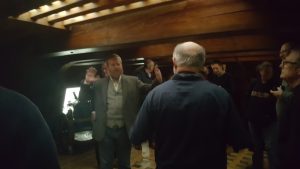
Dr Fred Hocker explaining the space and features of the Vasa’s gun deck in a scaled recreation. (M. Bassett)
Sjöhistoriska (The Maritime Museum) and the Historiska Muséet (The Swedish History Museum)
We also had a curator take us around the Viking exhibition at the Historiska Museum and an underwater archaeologist explain his experience of diving among the Viking wrecks. Due to a power failure (!) we were also hugely lucky to have a private tour of the Maritime Museum with a curator, who answered the many questions of the students.
“The three museum visits – Viking, Vasa and Maritime – were memorable not only because of the standards of artefacts and display, but also because of the warm welcome and fascinating talks by the curators and others. I also found the curatorial policies interesting. Consciously avoiding gratuitous display of human remains, conspicuously downplaying any ‘glorious’ aspects of war and returning artefacts to their countries of origin were common practice in all museums we saw. This is not neutral curating and it confirmed for me how much influence the actual curating of museums can have on its audience.” John
“I found all the guides excellent at their respective presentations and also the fascinating findings at the Viking village.” Fred
“Great to have a private viewing of the Stockholm Maritime Museum and learn about the Swedish East India Company which made its fortune by importing tea from China and then smuggling it to Britain.” Phil.
“The chance to see the Viking artefacts at the historical museum was a bonus, the Viking boat was amazing.” Don
Socialising
Of course, a key part of these trips is the opportunity to meet other students, especially as it is a distance learning course!
“The social aspect was great, plenty of opportunity to learn how our fellow students were getting on and their particular interests.” Fred
“Jolly good company with like-minded people and a chance to put faces to virtual identities”. John
“The trip was a chance to actually meet the disembodied voices you’d been hearing for the last few months and get to know them over a drink and a chicken, pineapple, curry, and banana, pizza. Don’t ask.” Phil
‘It was lovely to meet up with everyone (although I didn’t make it to the pub). There’s a real English Pub trope in Stockholm, we saw the Charles Dickens, Big Ben, Londoner, Lord Nelson, and you went to the Tudor Pub!’ Don
Needless to say, we are already thinking about our next overseas trip – and will be visiting Greenwich next, for a curatorial tour.
For more information about the course, please see here: http://www.port.ac.uk/courses/history-politics-and-social-studies/ma-naval-history/

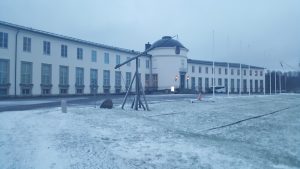
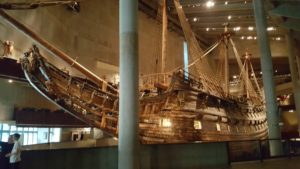
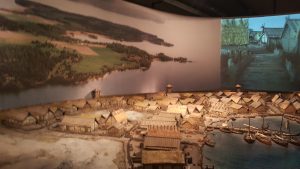
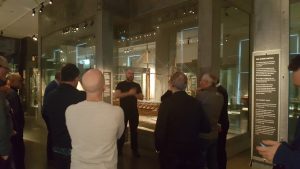
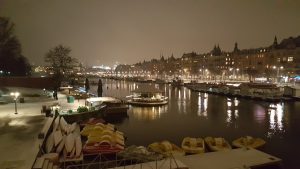









Comments are closed.